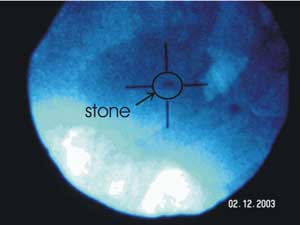X-ray image of a stone and gas before
(above) and after (below) lithotripsy treatment.
The similarity in appearance between the stone
before and after treatment indicates why the new
monitor is required

| The current
procedure, called lithotripsy, focuses thousands of
shock waves onto kidney stones in an effort to break
them into small pieces which can then be dissolved by
drugs or passed from the body in urine. However, it is
difficult to discover exactly when the treatment has
succeeded in breaking the stone and patients frequently
have to experience more shocks than necessary.
The 'smart stethoscope' listens to the echoes, which
reverberate around the body after each shock wave. The
device has also been used clinically at the London
hospitals Guy’s and St Thomas’.
'It is an imperfect analogy, but consider a
railwayman walking along the length of a train, hitting
the metal wheels with a hammer,' explained Professor
Leighton. 'If the wheel rings nicely, he knows that it
is not cracked. If the wheel is cracked, it gives a
duller sound.
'We are looking for the stone to go from being intact
at the start of treatment (when it will give a nice ring
"tick" sound) to being fragmented at the end of the
treatment (when it will give a duller "tock" sound).'
A website containing recordings of these sounds, and
other information on the project, is at www.isvr.soton.ac.uk/fdag/litho.htm
In addition to Professor Leighton and Dr Coleman, the
team involved Dr Paul White of ISVR, Graham Ball of AWE,
PhD students Fiammetta Fedele, Riza Jamaluddin and Cary
Turangan and Andrew Hurrell of Precision Acoustics
Ltd.
Commercial negotiations between the inventors, the
University's Centre for Enterprise and Innovation (CEI)
and manufacturers of lithotripters are underway. The
project was funded by the Engineering and Physical
Sciences Research Council
(EPSRC). | 